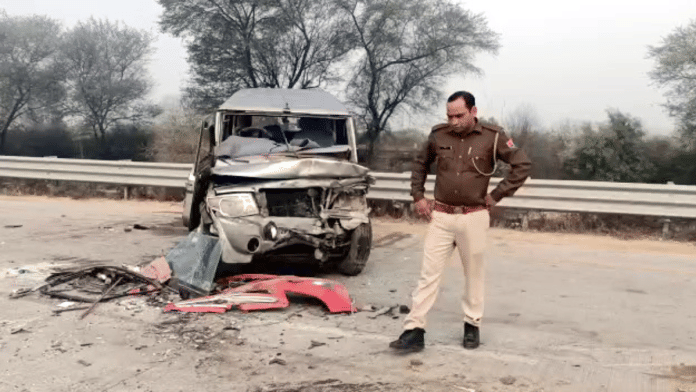New Delhi: Serious concerns have been flagged before the Supreme Court over the Uttar Pradesh Criminal Law (Composition of Offences and Abatement of Trials) (Amendment) Act, 2023 that allowed abatement of trials of offences registered under the Motor Vehicle Act between 2017 and 2022.
In a report, senior advocate Gaurav Aggarwal, who is assisting the apex court in a case on road safety, has raised objections to the manner in which Uttar Pradesh introduced the law to abruptly halt and end proceedings in 10 lakh cases under the MV Act, including drunk driving, without considering the gravity of the offences.
It was pointed out that the 2023 Act is not the first time that Uttar Pradesh has taken this step. The state introduced this measure in 1979 and, thereafter, repeated it in 2016 and 2018.
Aggarwal’s report submitted that the state, instead of taking effective steps to reduce motor vehicular offences, has, through the law, put a premium on violation of law because it allows termination of all criminal proceedings against a violator.
“The law encourages non-payment of fines and consequently encourages violation of the provisions of the MV Act,” his report said. According to the submission, the law protects every offender as it gives an assurance to terminate all future criminal proceedings.
Alarmed at the practice, a bench of Justices J.B.Pardiwala and K.V.Vishwanathan last week observed that abating the proceedings in one shot would remove the deterrent effect of these offences. The impact of such a provision is going to be drastic, the bench directed the UP government to file its response to a plea that has sought striking down of the 2023 Act as unconstitutional.
Filed by an Agra-based lawyer, the application questions the constitutional validity of the Act because it does not discriminate between offences and is also repugnant to the MV Act, approved by Parliament, that demarcates offences under various sections.
The central law categories offences as compoundable, non-compoundable, summary disposal cases and matters that invite statutory consequences such as suspension of driving licenses.
The second ground on which the prayer to set aside the law has been made is that it does not have the President’s assent, which is necessary when a state law is repugnant to a central Act.
According to the petition, the UP government had got the approval in 1979, but did not follow the mandate to seek the President’s nod in 2016, 2018 and 2023.
In its preliminary response, the Uttar Pradesh government has justified the law. A short affidavit submitted last week said that the decision to amend the law to terminate of all prosecutions was taken after the Allahabad High Court wrote a letter, asking the state to take steps to reduce pendency of cases.
But, Aggarwal’s report dismissed the explanation and felt that the state was taking advantage of its own wrong. “The state should ensure that challans are generated for all traffic offences, fines are realised and court summons are served and the prosecutions are diligently pursued so that drivers and owners are caught,” it said.
Urging the court to declare this practice, spanning for an uninterrupted period, as arbitrary and unjust, Aggarwal said the systematic abatement of trials for the MV Act offences incentivised traffic rule violations, instead of serving as a deterrent to errant drivers.
“This lax approach has led to a disregard for traffic regulations, resulting in a surge in road accidents, fatalities, and injuries,” the report said.
It also pointed to the dismal disposal rate of the challans. Out of 3.57 crore issued since 2018, only 0.96 crore challans have been decided. This reflected the state’s inefficiency in enforcing traffic laws.
“Having failed its duty to enforce the provisions of the MV Act, an easy way out is sought to be taken which is not consistent with the obligation of the state to enforce discipline and protect road users from avoidable accidents,” the report said.
(Edited by Tony Rai)






